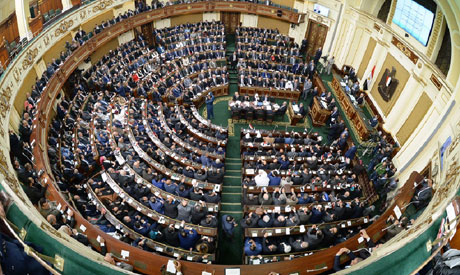
Egyptian parliament (Reuters)
Egypt's parliament approved on Tuesday a number of laws including the 47-article government-drafted Youth Institutions Law, which bans youth centres from engaging in political activity.
The first article of the law prohibits employees of youth centres from using the centre premises for partisan activities or to promote political or religious agendas.
Last month, speaker Ali Abdel-Aal said the law would help restrict political activities to licensed political parties, as “the constitution makes it clear that youth centres cannot be forums for raising political issues.”
“Politics as a science includes many ideas that are studied in schools and universities. But what we are talking about here is the indoctrination of young people, which clearly should not happen in youth clubs and the like.”
Abdel-Aal's stance has received some support from MPs, including Ayman Abul-Ela of the Free Egyptians Party who agreed clubs should not be used “as centres for promoting political or religious agendas.”
A number of MPs, however, wanted to amend the law, insisting that youth clubs should be forums for political activities.
"[Young people] need to talk politics in a healthy way in clubs instead of falling prey to extremist groups," said MP Samir Ghattas on Tuesday.
Article 31 of the law also bans smoking, gambling and alcohol from youth centres and prevents them from engaging in any form of financial speculation.
Abdel-Aal said the law was revised in constitutional and legal terms by the state council. More than two thirds of MPs stood up as a sign of approval of the law.
Ban on drones
Another law that was passed bans the use of remotely operated aircraft, commonly known as drones. Abdel-Aal told MPs that the law was also revised by the State Council.
The regulation of the use of electronic and wireless-operated aircraft and their handling and trade bans “drones capable of carrying explosives or weapons systems that could pose a danger to national security.”
Article 1 makes the Ministry of Defence the sole authority responsible for licensing the use of drones. Article 2 bans ministries, local councils, public institutions, companies and individuals from importing, manufacturing, assembling, handling or trading in drones without prior approval from the Ministry of Defence.
Another article sets prison terms ranging from one to seven years, and fines of EGP 5,000 to EGP 50,000, for anyone found to have violated the first two articles. In cases where drones have been used to facilitate terrorist attacks, the death sentence can be applied.
Major General Mamdouh Shahin, deputy defence minister for constitutional affairs and military justice, told MPs on 7 November that the law does not impose a total ban on drones, but allows them to be used “with the prior and exclusive approval of the Ministry of Defence.”
Trade union regulations
MPs also endorsed a new law aimed at regulating the formation of trade unions.
Mohamed Abdel-Fattah, a member of parliament's Manpower Committee, told MPs on 7 November that the 83-article law strives to adhere to the 2014 constitution.
"Article 76 of the constitution states that workers would be free to form trade unions in a democratic way and that these unions can only be dissolved by a final judicial ruling," said Abdel-Aal, adding that the law "sounds the death knell of the old socialist policy that brought trade unions under the umbrella of a single entity – the General Egyptian Federation of Trade Unions (GEFTU)."
Article 12 of the law stipulates a quorum of 250 workers in any industrial plant or economic establishment is sufficient to form a trade union committee to safeguard the rights of all workers. Article 13 stipulates no less than 20 trade union committees comprising at least 30,000 workers are needed to form a fully-fledged trade union.
Speaker Abdel-Aal said the law was revised by the State Council, MPs approved it by standing up.
Short link: